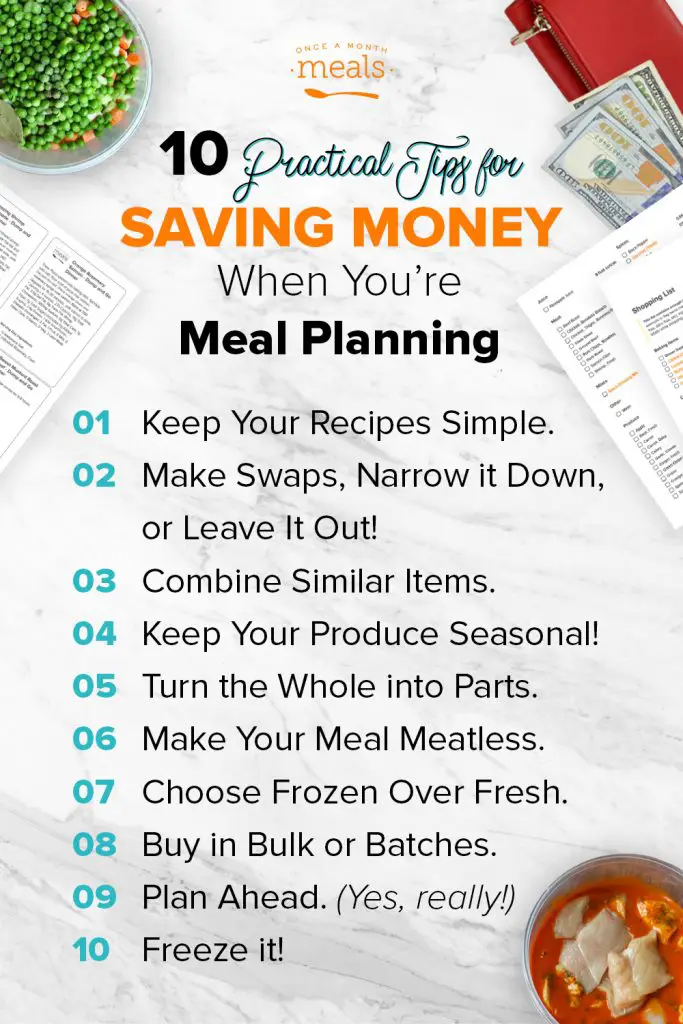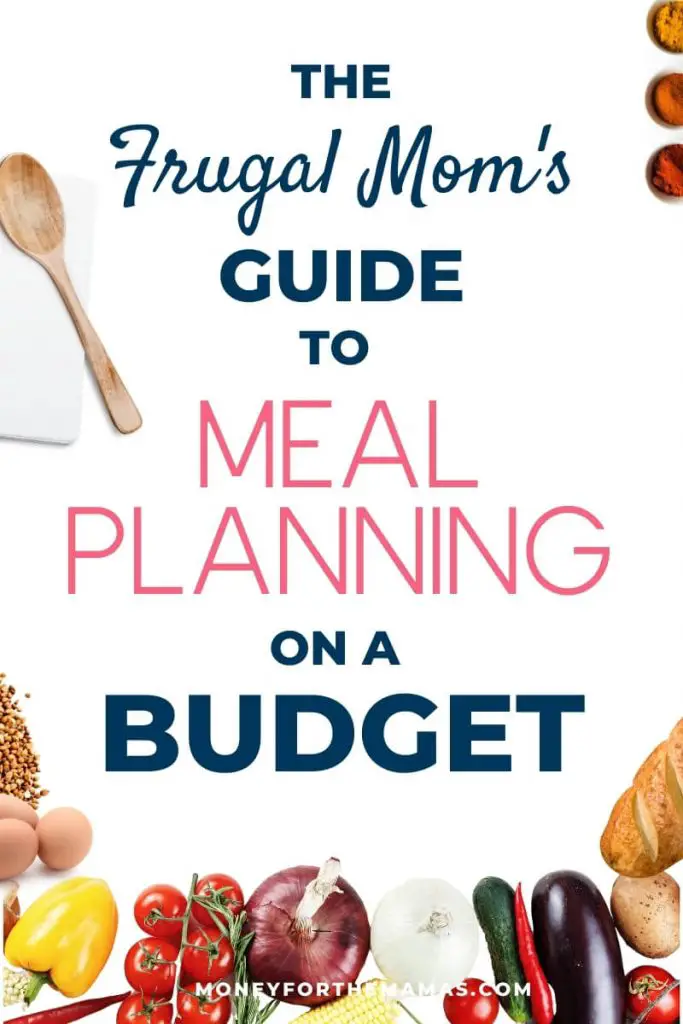Introduction
Meal planning is a simple yet effective strategy that has become my secret weapon for saving money. It has not only helped me stay within my budget, but it has also transformed the way I approach food and cooking. In this article, I will share with you the importance of saving money, the impact of meal planning on your finances, and how it fits perfectly into a frugal lifestyle.
Why saving money is important
Saving money is crucial for a variety of reasons. Firstly, it provides us with financial security and peace of mind, allowing us to handle unexpected expenses or emergencies without going into debt. Secondly, saving enables us to work towards our long-term goals, whether it’s buying a house or planning for retirement. And lastly, having financial freedom allows us to enjoy life’s little luxuries and experiences without constantly worrying about money.
The impact of meal planning on saving money
Meal planning is a game-changer when it comes to saving money. By taking the time to plan your meals ahead, you can stay organized and avoid impulsive purchases or costly take-out meals. With a well-thought-out meal plan, you’re able to create a shopping list based on what you already have in your pantry and what’s on sale at the grocery store. This eliminates food waste and reduces the amount of money you spend on groceries each week. Additionally, by cooking at home more often and packing lunch for work, you can save a significant amount of money compared to eating out.
How meal planning fits into a frugal lifestyle
Meal planning aligns perfectly with a frugal lifestyle. By being intentional about the way you spend money on food, you can control your grocery budget and eliminate unnecessary expenses. Being frugal doesn’t mean sacrificing taste or variety in your meals; instead, it encourages you to be creative with what you have and find affordable alternatives. By incorporating meal planning into your frugal lifestyle, you not only save money but also develop a healthier relationship with food and make more sustainable choices.
meal planning has become my secret weapon for saving money. By embracing this strategy, I have been able to prioritize my savings, reduce food waste, and maintain a frugal lifestyle without compromising on taste or variety. So, if you’re looking to take control of your finances and make the most out of your grocery budget, I highly recommend giving meal planning a try. It may just be the game-changer you’ve been searching for.

Benefits of Meal Planning
Meal planning is one of the most effective strategies when it comes to saving money and embracing a frugal lifestyle. Not only does it help you reduce your grocery bills, but it also ensures that you have nutritious meals while minimizing food waste. Additionally, it allows you to rely less on takeout and dining out, further contributing to your financial well-being. Let’s delve into the specific benefits of meal planning.
Reduction in food waste
One of the main advantages of meal planning is the significant reduction in food waste. By planning your meals in advance, you can buy the exact quantities of ingredients needed for each recipe, minimizing the chances of unused produce going to waste. Gone are the days of discovering a forgotten bag of wilted lettuce or spoiled leftovers at the back of your refrigerator. With meal planning, you can confidently use up all your fresh ingredients while maintaining an organized and clutter-free kitchen.
Lower grocery bills
Another compelling reason to embrace meal planning is the potential for substantial savings on your grocery bills. When you plan your meals and create a well-thought-out shopping list, you are less likely to make impulsive purchases or buy items that you already have in your pantry. By sticking to your list and buying only what you need, you can avoid overspending and make the most of your hard-earned money. Vowing to eat at home more often and taking advantage of weekly sales and coupons also significantly contribute to the decrease in your grocery expenses.
More nutritious meals
Meal planning also ensures that you and your loved ones have access to healthier and more nutritious meals. Instead of relying on processed convenience foods or opting for takeout, you have the opportunity to include a variety of fruits, vegetables, whole grains, and lean proteins in your weekly menu. By carefully selecting the ingredients for your meals, you have control over the nutritional value and can prioritize the inclusion of wholesome, nutrient-dense foods that support your well-being.
Less reliance on takeout and dining out
Lastly, meal planning allows you to break free from the never-ending cycle of takeout and dining out, which can drain your bank account faster than you realize. By preparing meals in advance and having a clear plan for the week, you are less tempted to order takeout or dine at restaurants. Instead, you can enjoy the comfort of home-cooked meals that are not only tastier but also significantly more cost-effective. Over time, this shift in your eating habits can lead to substantial savings and contribute to your overall financial goals.
meal planning is a valuable tool in your frugal lifestyle arsenal. It helps reduce food waste, lowers grocery bills, promotes more nutritious meals, and reduces reliance on takeout and dining out. By incorporating meal planning into your routine, you can save money, improve your health, and enjoy the satisfaction of having delicious meals prepared with love at home.

Getting Started with Meal Planning
Assessing your goals and dietary needs
When it comes to saving money, meal planning is my secret weapon. It helps me stay on track with my frugal lifestyle and ensures that I make the most out of every food purchase. To get started with meal planning, the first step is to assess your goals and dietary needs.
Take a moment to think about what you want to achieve through meal planning. Are you looking to cut down on grocery expenses, eat healthier, or simply make your life easier? Once you have a clear goal in mind, consider your dietary needs. Do you have any allergies, restrictions, or special preferences? This will help you to tailor your meal plan accordingly and ensure that you are making dishes that you and your family will enjoy.
Creating a weekly meal planning schedule
To make meal planning a habit, it’s helpful to create a weekly schedule. Choose a day of the week to sit down and plan out your meals for the upcoming week. Look at your calendar and take note of any busy days or events that may impact your meal choices. This way, you can plan meals that are quick and easy on those busy nights or save more elaborate recipes for days when you have more time.
Researching and organizing recipes
Once you have your schedule in place, it’s time to start researching and organizing recipes. I like to browse through cookbooks, recipe websites, and even Pinterest for inspiration. Look for recipes that align with your goals and dietary needs. Consider recipes that use similar ingredients to minimize waste and save money.
Organize your recipes in a way that is convenient for you. Some people prefer to create a physical binder or folder to store printed or handwritten recipes. Others may choose to use online tools or apps to keep everything organized digitally. Find a method that works best for you and makes it easy to access your recipes when you need them.
Making a comprehensive grocery list
The final step in getting started with meal planning is to make a comprehensive grocery list. Go through your planned recipes and make note of all the ingredients you will need. As you create your list, be sure to check your pantry and fridge to see what you already have. This will help you avoid unnecessary purchases and minimize food waste.
When making your grocery list, I find it helpful to organize it by sections, such as produce, meat, dairy, and pantry staples. This makes it easier to navigate the store and ensures that you don’t forget anything. As you write down each item, be specific about quantities to avoid overbuying or running out of ingredients.
By taking the time to assess your goals and dietary needs, creating a weekly schedule, researching and organizing recipes, and making a comprehensive grocery list, you’ll be well on your way to mastering the art of meal planning. This secret weapon will not only save you money but also make your life more efficient and enjoyable in the process. Happy planning!

Tips and Tricks for Effective Meal Planning
Batch cooking and meal prepping
One of the best ways to save money and stick to a frugal lifestyle is by embracing the art of meal planning. By taking a little time to plan out our meals for the week, we can make smart choices that save both time and money. In this section, I will share some of the tips and tricks I’ve learned along the way to make meal planning an effective and efficient practice.
Using seasonal produce and sales
One of the first things I consider when meal planning is the availability of seasonal produce. Why? Because seasonal fruits and vegetables tend to be more affordable and taste better than their out-of-season counterparts. By taking advantage of what’s in season, I can create delicious and nutritious meals without breaking the bank. Additionally, I keep an eye out for sales and discounts at my local grocery store. When certain ingredients are on special, I incorporate them into my meal planning to save even more money.
Maximizing leftovers
Another way to stretch our food dollars is by maximizing leftovers. Whenever I cook a meal, I always make extra so that I have leftovers for the following day. Leftovers can be a lifesaver on busy nights when I don’t have time to cook from scratch. They can also be used creatively in different recipes, reducing food waste and saving money.
Incorporating affordable ingredients
When it comes to meal planning on a budget, it’s important to incorporate affordable ingredients into our recipes. Instead of using expensive cuts of meat, for example, I opt for more affordable alternatives like chicken thighs or ground beef. Additionally, I rely on inexpensive staple foods such as beans, rice, and pasta to bulk up my meals and keep costs down.
By implementing these tips and tricks, meal planning becomes a secret weapon for saving money. With a little effort and creativity, we can enjoy delicious and nutritious meals while staying within our budget.

Strategies for Saving Money through Meal Planning
Meal planning is a frugal lifestyle tool that has become my secret weapon for saving money. Not only does it help me stay organized and reduce food waste, but it also allows me to cut down on impulse purchases and unnecessary trips to the grocery store. By taking the time to plan my meals in advance, I have been able to save a significant amount of money each month. Here are a few strategies that have been particularly effective for me:
Planning meals around pantry staples
One of the key ways to save money through meal planning is to utilize the ingredients you already have in your pantry. By incorporating pantry staples such as rice, pasta, canned beans, and spices into your meal plans, you can avoid buying unnecessary items and make the most out of what you already have. This not only saves money but also reduces food waste.
Reducing meat consumption
Another effective strategy for saving money is to reduce meat consumption in your meal plans. Meat tends to be one of the most expensive items on grocery lists, so by incorporating more plant-based protein sources like beans, lentils, and tofu, you can significantly reduce your grocery bill. Additionally, adding more vegetarian or vegan meals into your rotation can have health benefits and reduce your environmental impact.
Shopping in bulk and utilizing discounts
When meal planning, it’s important to take advantage of bulk buying and discounted items. Buying in bulk can save you money in the long run, especially for non-perishable items like grains, legumes, and spices. Additionally, keeping an eye out for sales, coupons, and discounts can help you save even more on your grocery bill.
Meal planning for special occasions and holidays
Meal planning is not limited to everyday meals – it can also be a useful tool for saving money during special occasions and holidays. By planning ahead and making a list of the ingredients you’ll need, you can avoid last-minute and impulse purchases, which tend to be more expensive. This way, you can enjoy special meals without breaking the bank.
meal planning is a powerful money-saving tool. By planning meals around pantry staples, reducing meat consumption, shopping in bulk, and utilizing discounts, you can significantly cut down on your grocery expenses. Additionally, meal planning for special occasions and holidays can help you stay within budget while still enjoying delicious and memorable meals. Incorporating these strategies into your meal planning routine can lead to substantial savings and a more frugal lifestyle.

Meal Planning Resources
When it comes to saving money and living a frugal lifestyle, meal planning is truly my secret weapon. It has completely transformed the way I approach grocery shopping and cooking, and has saved me a significant amount of money in the process. In this section, I will introduce you to some amazing meal planning resources that you can utilize to make your frugal journey even more successful.
Mobile Apps and Online Tools
One of the easiest and most convenient ways to plan your meals is through the use of mobile apps and online tools. These platforms offer a wide range of features, such as recipe suggestions, customizable meal plans, and integrated grocery lists. Personally, I have found great success with apps like Mealime and Plan to Eat. They allow me to easily select recipes, generate shopping lists, and even share meal plans with family members. With these tools at your fingertips, the process of meal planning becomes a breeze.
Cookbooks and Recipe Websites
If you prefer a more traditional approach, there are plenty of cookbooks and recipe websites available that can help you with meal planning. Websites like Budget Bytes and Allrecipes offer a vast selection of budget-friendly recipes that are not only delicious but also easy to prepare. Cookbooks such as “Good and Cheap” by Leanne Brown or “The $5 Dinner Mom Cookbook” by Erin Chase are also fantastic resources to consider. These resources are filled with budget-friendly recipes and helpful tips for meal planning on a tight budget.
Community and Forum Support
Lastly, don’t underestimate the power of community and forum support when it comes to meal planning. Joining online communities or forums dedicated to frugal living and meal planning can provide you with a wealth of information, inspiration, and support. These platforms allow you to connect with like-minded individuals who can offer valuable advice and share their own meal planning tips. Websites like Reddit’s r/Frugal, The Simple Dollar’s forum, or Meal Planning Mommies’ Facebook group are great places to start.
By leveraging these meal planning resources, you can take your frugal lifestyle to the next level. Whether you opt for mobile apps, cookbooks, or online communities, these tools will undoubtedly make your meal planning journey more efficient and enjoyable. So why wait? Start exploring these resources today and watch the savings add up!
Meal Planning: Your Secret Weapon for Saving Money
Overcoming Challenges and Obstacles
Dealing with Picky Eaters
One of the biggest challenges when it comes to meal planning is dealing with picky eaters. Trust me, I know how frustrating it can be to spend time and effort creating a nutritious and delicious meal, only to have it rejected by a family member. However, there are ways to overcome this obstacle.
First, involve your picky eaters in the meal planning process. Ask them for their input and suggestions. This will give them a sense of ownership and make them more likely to try new foods. You can also try incorporating their favorite ingredients into the dishes, or find creative ways to present the food so it becomes more appealing to them.
Adapting to Dietary Restrictions
Another obstacle that many people face when meal planning is adapting to dietary restrictions. Whether you or someone in your family has specific dietary needs, such as allergies, intolerances, or a specific diet plan, it’s important to find ways to accommodate these requirements without compromising on taste or variety.
One approach is to focus on whole, unprocessed foods that can be easily customized. For example, if someone in your family is gluten-free, you can substitute gluten-free grains like quinoa or rice in your recipes. You can also experiment with different cooking techniques and spices to add flavor to meals without relying on common allergens.
Managing Time Constraints
Time constraints are a common obstacle that can make meal planning seem overwhelming. However, with a little organization and preparation, it’s possible to tackle this challenge head-on.
Start by setting aside a specific time each week to plan and prep your meals. This could be on a Sunday afternoon or during a less busy day of the week. Use this time to create a menu for the week, make a shopping list, and do some basic meal prep, such as chopping vegetables or marinating meats.
Staying Motivated and Consistent
Lastly, staying motivated and consistent with meal planning can be tough, especially when life gets busy. However, there are strategies that can help you stay on track.
One effective approach is to find inspiration for your meals. Browse cookbooks or websites for new and exciting recipes. Try incorporating theme nights, like Taco Tuesday or Stir-Fry Friday, to add a sense of fun and variety to your meal plan. You can also enlist the support of your family or friends, and make meal planning a collaborative effort.
Remember, by overcoming these challenges and obstacles, you can harness the power of meal planning to save money and create healthy, delicious meals for yourself and your loved ones. So why not give it a try? You’ll be amazed at the positive impact it can have on your frugal lifestyle.
Success Stories and Testimonials
Real-life examples of saving money through meal planning
Let me share with you some success stories and testimonials from individuals who have discovered the power of meal planning in their quest for a frugal lifestyle. These stories are living proof of how meal planning can be your secret weapon for saving money!
One individual, Kathy, used to spend a considerable amount of money on takeout and dining out. However, since she started meal planning, she has been able to cut down her food expenses by a whopping 30%. Kathy meticulously plans her meals for the week, taking advantage of sales and discounts at her local grocery stores. By shopping with a list and sticking to it, she avoids impulse purchases and only buys what she needs for the week. Kathy emphasized that the key to her success is having a well-thought-out plan and sticking to it.
Another testimonial comes from Mark, a busy professional who used to dread cooking at home after a long day at work. However, he discovered that with meal planning, he could streamline his cooking process and save both time and money. Mark now dedicates a couple of hours on the weekend to prepare and cook his meals for the week. By doing this, he minimizes his reliance on expensive convenience foods and takeout. Mark also mentioned that meal planning has helped him eat healthier, as he is now in control of the ingredients he uses and can incorporate more nutritious options into his meals.
Tips and experiences from successful meal planners
Meal planning success stories like Kathy’s and Mark’s offer valuable insights into the benefits and strategies for saving money through meal planning. Here are some tips and experiences from successful meal planners that you can apply to your own journey:
- Plan your meals based on sales and discounts at your local grocery stores to maximize savings.
- Create a grocery shopping list and stick to it. Avoid making impulse purchases, as they can quickly add up.
- Dedicate a specific time each week for meal prepping and cooking to save time and effort during busy weekdays.
- Experiment with batch cooking and freezing meals for future consumption. This allows you to take advantage of bulk purchases and reduces food waste.
- Embrace simple and versatile recipes that use common ingredients, making it easier to plan and shop.
By incorporating these tips and experiences into your meal planning routine, you’ll be on your way to saving money while enjoying delicious and nutritious meals.
Meal planning truly is a secret weapon for frugal individuals seeking to tighten their budgets. It empowers you to take control of your food expenses, minimize waste, and make healthier choices. So why not give it a try? Start your meal planning journey today and see the positive impact it can have on your wallet and overall well-being.
Long-Term Benefits of Meal Planning
Meal planning has become a crucial component of my frugal lifestyle. In addition to helping me manage my finances, it has also had several long-term benefits that have positively impacted my health, cooking skills, stress levels, and overall time management. Let me share with you some of the ways in which meal planning has transformed not only my approach to food but also my overall well-being.
Developing Healthier Eating Habits
One of the significant benefits of meal planning is the opportunity to develop healthier eating habits. By carefully planning and selecting ingredients for each meal, I can ensure that I am including a variety of nutritious foods in my diet. This has resulted in increased energy levels, improved digestion, and a strengthened immune system. Moreover, meal planning has helped me curb unhealthy food cravings and reduce my dependency on processed foods, leading to better long-term health outcomes.
Improving Cooking Skills
Meal planning has provided me with endless opportunities to expand and refine my cooking skills. By trying out new recipes and experimenting with different flavors and techniques, I have become more confident in the kitchen. Furthermore, meal planning has allowed me to make the most of the ingredients I have on hand, leading to creative and delicious meals. Over time, I have gained valuable culinary knowledge that has not only saved me money but also brought me immense joy and satisfaction.
Reducing Stress and Decision Fatigue
Another crucial benefit of meal planning is the significant reduction in stress and decision fatigue it offers. Knowing what I will be cooking and having all the necessary ingredients readily available eliminates the daily anxiety of figuring out what to eat. This not only makes mealtime more enjoyable but also reduces the temptation of resorting to expensive takeout or unhealthy fast food options. By having a clear plan in place, meal planning allows me to focus on other aspects of my life without the added burden of constant food-related decision-making.
Saving Time in the Long Run
Contrary to popular belief, meal planning has actually saved me a considerable amount of time in the long run. Although it requires some pre-planning and preparation, it ultimately streamlines my cooking process. By batch cooking and utilizing leftovers, I can make the most of my time spent in the kitchen. Additionally, having a well-thought-out meal plan ensures that I can efficiently navigate the grocery store, avoiding unnecessary trips and impulse purchases. As a result, I have been able to reclaim precious time and allocate it to other important aspects of my life.
Meal planning truly is a secret weapon when it comes to saving money. However, the long-term benefits extend far beyond financial savings. By developing healthier eating habits, improving cooking skills, reducing stress and decision fatigue, and saving time, meal planning has become an invaluable tool in enhancing my overall well-being. So why not give it a try? You may be surprised by the positive impact it can have on your life too.
Additional Money-Saving Tips
When it comes to meal planning, there are a few additional strategies that can help you save even more money. With a frugal lifestyle in mind, these tips will ensure that your wallet remains thick while still enjoying delicious and nutritious meals.
Smart Grocery Shopping Strategies
One of the crucial elements of successful meal planning is smart grocery shopping. Before heading to the store, take some time to create a list of the items you need. Stick to this list, and avoid impulse purchases. Buying in bulk can also be a great way to save money, especially for non-perishable items that you use frequently. Additionally, consider shopping at discount stores or taking advantage of local farmer’s markets for fresher and often more affordable produce options.
Meal Planning on a Budget
Meal planning can be a lifesaver when it comes to stretching your budget. Take a look at the sale flyers from your local grocery store and plan your meals around the items that are on sale. This way, you can take advantage of the discounted prices and ensure a variety of meals throughout the week. Utilize inexpensive and versatile ingredients, such as beans, rice, and pasta, to create budget-friendly recipes. Furthermore, preparing meals in large batches and freezing leftovers can be a great way to save both time and money.
Utilizing Leftovers Creatively
Leftovers often get a bad reputation, but with a little creativity, they can become the star of your next meal. Transform last night’s roasted chicken into a flavorful chicken salad or incorporate leftover vegetables into a hearty soup. Not only does this prevent food waste, but it also saves money by eliminating the need to buy additional ingredients for new meals.
Reducing Food Delivery and Eating Out
While dining out or ordering food delivery can be convenient, it can also rapidly drain your bank account. Limiting the number of times you eat out each week and opting for homemade meals can lead to substantial savings. Consider treating yourself to a restaurant-quality meal on special occasions rather than making it a regular habit.
By implementing these additional money-saving tips, you can maximize your meal planning efforts and achieve significant savings while still enjoying delicious and satisfying meals. With a little planning and creativity, you can make your frugal lifestyle both budget-friendly and enjoyable.
Conclusion
Recap of the importance of meal planning for saving money
In conclusion, I cannot stress enough the importance of meal planning when it comes to saving money. By taking the time to plan out your meals for the week, you will not only eliminate unnecessary trips to the grocery store but also reduce the chances of impulse purchases. With a well-thought-out meal plan, you can make a grocery list, stick to it, and avoid overspending on items you don’t really need.
Additionally, meal planning allows you to take advantage of sales and discounts, as you can plan your meals around what’s on sale at your local grocery store. This means you’ll be purchasing ingredients at their lowest prices, ultimately stretching your budget further.
Encouragement to start meal planning today
If you’re not already meal planning, I encourage you to start today. It may seem overwhelming at first, but trust me, the benefits are worth it. Start small by planning just a few meals for the week and gradually increase the number as you become more comfortable with the process. You can even involve your family or roommates in the planning process to make it more enjoyable and collaborative.
Remember, meal planning is not only about saving money, but it also helps you eat healthier and reduces food waste. By having a plan in place, you can ensure that you’re incorporating a variety of nutritious meals into your diet while making the most of the ingredients you have on hand.
Final thoughts on incorporating meal planning into a frugal lifestyle
Incorporating meal planning into a frugal lifestyle goes hand in hand. By being intentional about what you eat, you are making a conscious effort to take control of your finances. As you make a habit out of meal planning, you will not only see the impact on your grocery bill but also on your overall financial well-being.
Meal planning is a powerful tool that empowers you to save money, reduce stress, and make healthier eating choices. So, why wait? Start meal planning today and unlock the secret weapon to maximizing your savings while enjoying delicious and budget-friendly meals.
